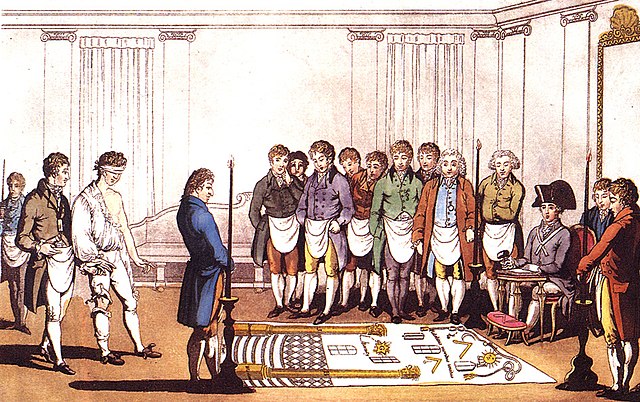Freemasonry
group of fraternal organizations From Wikipedia, the free encyclopedia
Remove ads
Freemasonry is a fraternal organization of men who believe in brotherhood and helping others. Its members are known as "Freemasons" (in full "Ancient Free and Accepted Masons") or simply as "Masons"). Freemasons also help one another in times of hardship. Freemasonry can be found all over the world in various forms, and about 6 million people are Freemasons.[1]


The local groups in various countries are known as "lodges". At the state or national level are "Grand Lodges", which are independent of one another. "Regular" Freemasonry is only for men, but there are also co-educational Masonic lodges (and women-only lodges) that are not recognized as legitimate by the "regular" lodges. All of those lodges believe in "brotherly love, relief and truth". The lodges do work for charities such as running schools for orphaned children. There is a Royal Masonic Hospital, a home for old members and their families.[2]

The word mason means a construction worker who works with stone. He is also called a "stonemason". Freemasonry grew from the groups (guilds) of stonemasons in the Middle Ages whose men built cathedrals and other large buildings. They were called freemasons because they were free; they were not servants who belonged to a rich lord, as many workers were in those days. Stonemasons often changed jobs and moved from one town to another. In that way, they were different from other craftsmen, who often worked in one place and had guilds in one town. The stonemasons tried to keep their skills secret so that only they knew how to do their job. That is probably why the Freemasons have secret handshakes and passwords and swear to keep them secret.
About 1650, Masons' guilds started to allow people who were not masons. In 1717, the first Grand Lodge, the Grand Lodge of England, was formed. It developed into the governing body of Freemasonry in England. In 1813, it merged with a rival and is now called the United Grand Lodge of England.
Freemasonry is controversial and has been opposed. The Anti-Masonic Party, which was mainly Lutherans was important in early American politics from 1827 to 1834. The Catholic Church opposes Freemasonry[3] although Freemasonry itself does not ban Catholics. Political authorities also sometimes oppose it. Nazi Germany and Eastern Bloc nations outlawed freemasonry.
Remove ads
References
Wikiwand - on
Seamless Wikipedia browsing. On steroids.
Remove ads
